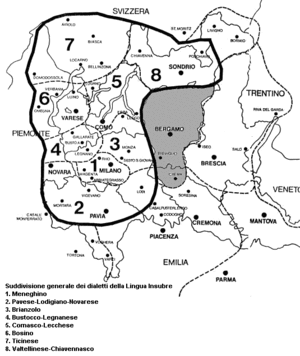Bergamasque dialect
| Bergamasque | |
|---|---|
| Bergamàsch | |
| Native to | Italy |
| Region | Lombardy |
Native speakers | 700,000 (date missing) |
|
Indo-European
| |
| Official status | |
| Regulated by | Ducato di Piazza Pontida (unofficial) |
| Language codes | |
| ISO 639-3 | – |
| Glottolog |
berg1241[1] |
 | |
...Se bé cognosse, che sto nost parlà
bergamasch no s'convè a lodà la zét,
gnè da fà pians, perché chi lès o sèt
al gà fà pio tost gni vòia d'grignà...—Giovanni Bressani, (1489–1560)
The Bergamasque dialect (sometimes also called Orobic, from the Orobii Celts[2]) is the western variant of the Eastern Lombard group of the Lombard language. It is mainly spoken in the province of Bergamo and in the area around Crema, in central Lombardy.
In Italian-speaking contexts, Bergamasque is often generically called a "dialect". This is often incorrectly understood as to mean a dialect of Italian, which actually is not the case. Bergamasque and Italian are not mutually intelligible, although today almost all Bergamasque speakers are also Italian speakers.
Bergamasque does not have any official status either in Lombardy or anywhere else: the only official language in Lombardy is Italian.
Classification
Bergamasque is a Romance language and belongs to the Gallo-Italic branch. Its position on the language family puts in evidence that it is genetically closer to Occitan, Catalan, French, etc. than to Italian.
Geographic distribution
Bergamasque is primarily spoken in the province of Bergamo and in the area around Crema, in central Lombardy.
Bergamasque is generally mutually intelligible for speakers of Eastern Lombard's variants of neighbouring areas (i.e. from Brescia) but this is not always true for distant peripheric areas, especially in alpine valleys. Differences include either lexical, grammatical and phonetic aspects.
Speakers
Monolingual Bergamasque speakers are now virtually non-existent. All Lombard speakers also speak Italian, and their command of each of the two languages varies according to their geographical position as well as their socio-economic situation, the most reliable predictor being the speakers' age.[3]
Samples of literary works in Bergamasque
[...] hec mulier id est la fomna et dicitur mulier, [...] hoc ignifer id est ol bernaz et dicitur ignifer [...]
E fì senorzat da Peter e incalzat da Martì, [...] cola pena mal temprata no po fì bona letra.—E. Zerbini, Note storiche sul dialetto bergamasco ex B. Belotti, op. cit. in note, Petrus dominatur mihi. Et Martinus insequitur me, [...] calamo quem quis male moderatus est non potest fieri bona littera
A nomo sia de Crist ol dì present
Di des comandament alegrament
I qua de de pader onnipotent
A morsis per salvar la zent.
E chi i des comandament observarà
in vita eterna cum Xristo andarà [...]—Ex B. Belotti, op.cit.
...Se bé cognosse, che sto nost parlà
bergamasch no s'convè a lodà la zét,
gnè da fà pians, perché chi lès o sèt
al gà fà pio tost gni vòia d'grignà...—Giovanni Bressani, (1489-1560)
I armi, i fomni, i soldacc, quand che in amôr
I andava d' Marz, af voi cuntà in sti vers,
Che fü in dol tèp che con tancc furôr
Al vign de za dol mar i Mor Pervers,
Condücc dal re Gramant, so car signôr,
Che voliva più Franza e l'univers
E destrüz sech Re Carlo e i Paladì
Per vendicà sò Pader Sarasì.—Belotti. op. cit.
Che per spiegass bé e spert, sciassegh e stagn
a tate lengue ch'è montade in scagn,
al Fiorentì, al Franses
la nost lagh dà neuf per andà ai dès.
[...]
Mi per efett de ver amour, de stima,
Lavori e pensi in prima
A i mè compatriogg a i mè terèr;
E dopo, se 'l men vansa, a i forestèr.—ex Belotti, op. cit.
Al vé vià quacc diàvoi chi gh'è mai
Al segn de quel teribel orchesù.
De pura 'l sa sgörlè i mür infernai.
E serè fò Proserpina i balcù;
I è röse e fiur, borasche e temporai,
Tempeste e sömelèc, saete e tru,
E a par de quel tremàs là zo de sot,
L'è cöcagna balurda 'l teremòt.—ex Belotti, op. cit.
Bibliography
- Bortolo Belotti, Storia di Bergamo e dei bergamaschi.
- Carmelo Francia, Emanuele Gambarini, Dizionario italiano-bergamasco, Bergamo, Grafital, 2001.
- Carmelo Francia, Emanuele Gambarini, Dizionario bergamasco-italiano, Bergamo, Grafital, 2004.
- Umberto Zanetti, La grammatica bergamasca, Bergamo, Sestante, 2004. ISBN 88-87445-59-1.
References
- ↑ Nordhoff, Sebastian; Hammarström, Harald; Forkel, Robert; Haspelmath, Martin, eds. (2013). "Bergamasco". Glottolog. Leipzig: Max Planck Institute for Evolutionary Anthropology.
- ↑ The Orobii were, more correctly, a Celtic-Ligurian people whose origins can be related to the Culture of Golasecca dating back from the 9th century BC.
- ↑ 2006 report by the Italian institute for national statistics.(ISTAT)
External links
- Orbilat - An interesting site more for western lombard, but the map of the distribution of the two main varieties is noteworthy.
- Italian/Bergamasque Dictionary - Carmelo Francia, Emanuele Gambarini - Ducato di piazza Pontida
- Ducato di piazza Pontida (folkloristical and linguistic association)
- Difficult phrases in Bergamasque
- A collection of comedies in Bergamasque
- a Casiratese-Italian vocabulary, a dictionary for the Bergamasque variety of Casirate d'Adda village, in Italian.